I left Bali (not that Bali) and continued following the road’s big loop around the mountains. I’d made it across the potentially dangerous border zone but Nigeria still had corrupt police and kidnapping gangs to be wary of.
On my left I could see the foothills of the mountains I’d crossed but anything higher was shrouded in cloud. To my right was flat farmland.
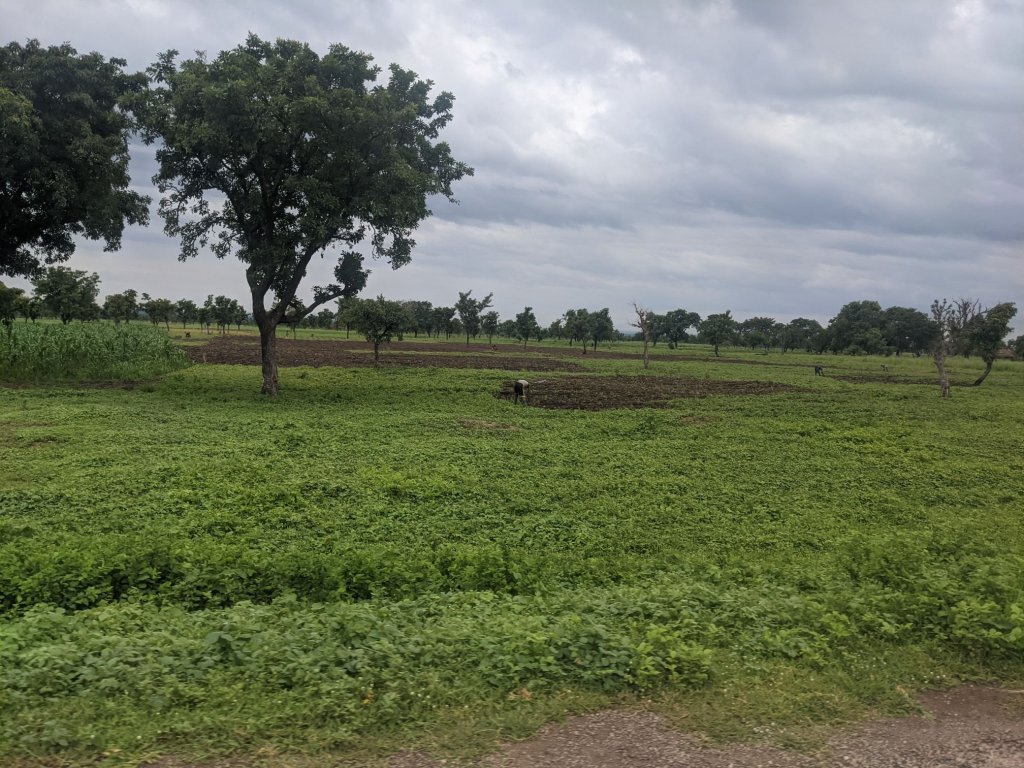
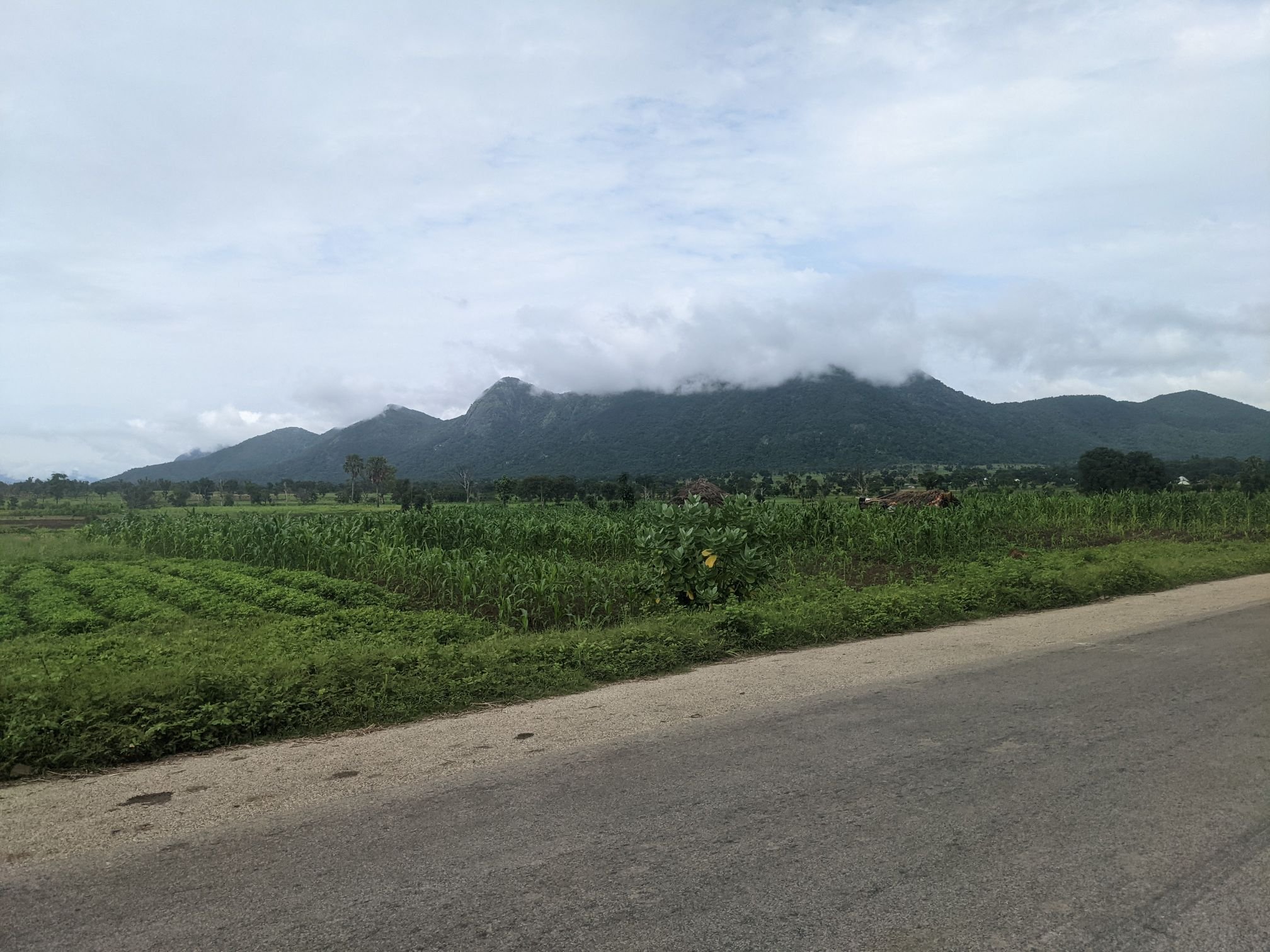
Mostly I rode past quiet hamlets consisting of a few round, straw-roofed huts. Once an hour or so I passed through a village, which were usually minor centres of trade. In one I picked up some fried yam from a street vendor. My verdict: stick to potato.
There are election posters everywhere, occasionally featuring some rather Nigerian spelling choices. I saw one canditate’s name spelled three different ways – unless the Honourable Captains Doughlas, Douglas and Douglass really are contesting the election.


I passed through Mararaba, a small town, but continued on toward Takum. The road got a bit more potholed but wasn’t too bad.
I reached Takum and went to a hotel recommended on iOverlander. The room had a fan and an AC. The AC would only work if there was mains power which, miraculously, there was – for the first time since I’ve been in Nigeria. It lasted well into the night so I had a reasonably comfortable sleep.
The road was exceptionally busy on the way out of Takum – or, more accurately, on the way in. Hundreds of motorbikes streamed along. Several, probably more than 1%, were driven by women.
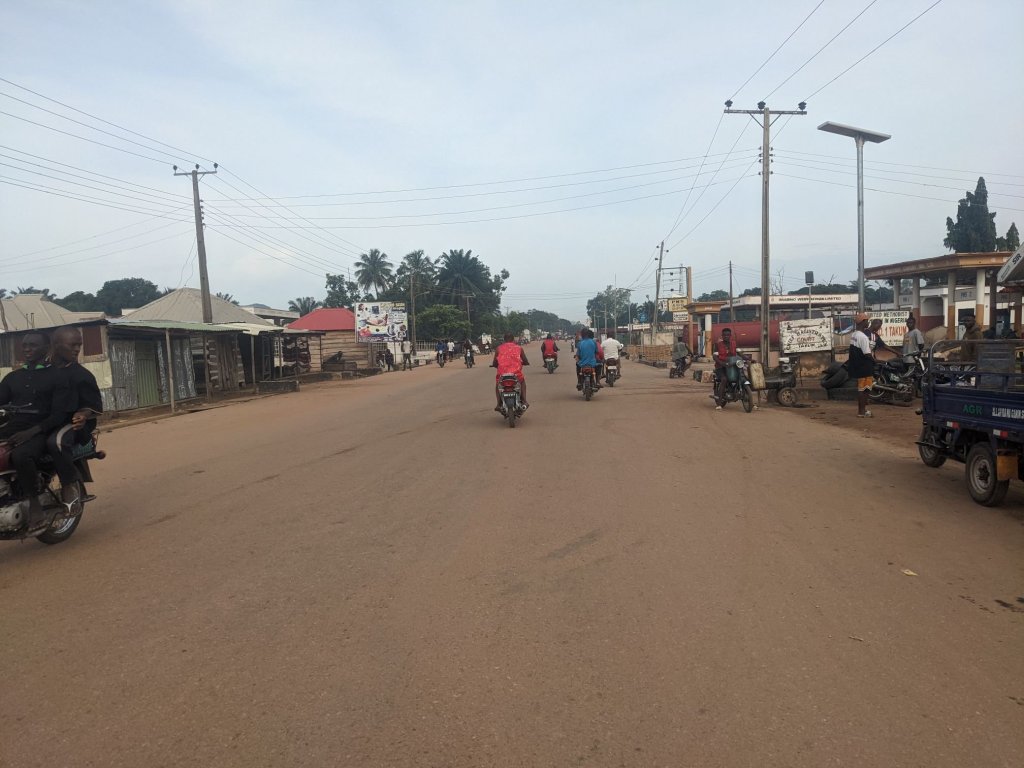

One of the reasons Nigeria is considered unsafe is because kidnapping is big business here. It’s most common in the north (because of Boko Haram) and the Niger Delta (because there are rich oilmen). It can happen anywhere though and this road from Takum to Katsina Ala used to have a reputation for it. It’s supposedly cleaned up now, and there was a significant police presence with even more checkpoints than usual. I managed to avoid stopping at any, though at a few of them people shouted out for me to do so.

A lot of this road was fairly quiet. There were small farming hamlets but not many bigger settlements. It was quite potholed but I could usually avoid the worst of them. Now that I was riding west, I had a headwind for the rest of my time in Nigeria (and beyond). I’d expected a headwind once I got to the Sahara but that’s still thousands of kilometres away!
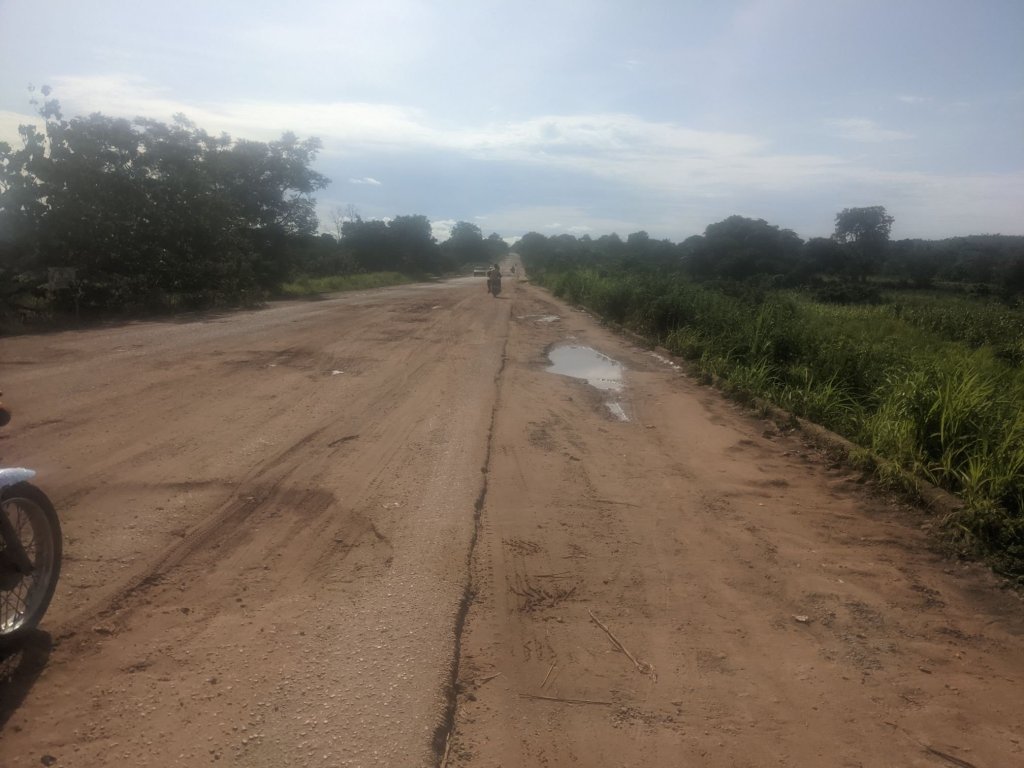
I reached Katsina Ala successfully unkidnapped. This town had a pretty bad reputation so I kept on riding, on a road that was now significantly busier and more potholed.

I was transitioning away from the majority Muslim, northern part of the country and into the southern, predominantly Christian part. With that came a change of ethnic group and language, so now I was called Oyibo and, on occasion, Jesus.
One of the worst things about the potholed roads is the behaviour of the traffic, constantly swerving all over the place. With this on top of the hundreds of people staring, pointing, laughing and shouting at me simply because I look different to them, I was feeling pretty exasperated by the time I reached Gboko.
It was a surprisingly big town and took a while to ride through. There was a shop that was called a supermarket. In most places it would be a minimarket and a small one at that, but it was the biggest shop I’d seen in Nigeria. I bought some expensive Pringles as a luxury.
I rode out of town and went to check into a hotel. I asked about AC at one hotel, and was directed to another. That was full so I went back to the first and checked in there. The guy was friendly and offered to bring me a floor fan as well as the ceiling one. It was powerful and so while it was on it was pleasantly cool. As is standard for Nigerian hotels, the generator only runs from 6 PM until an hour or two past midnight. I set up my tent on the bed but for much of the night slept outside it; so far there haven’t really been mosquitoes in Nigerian hotel rooms.
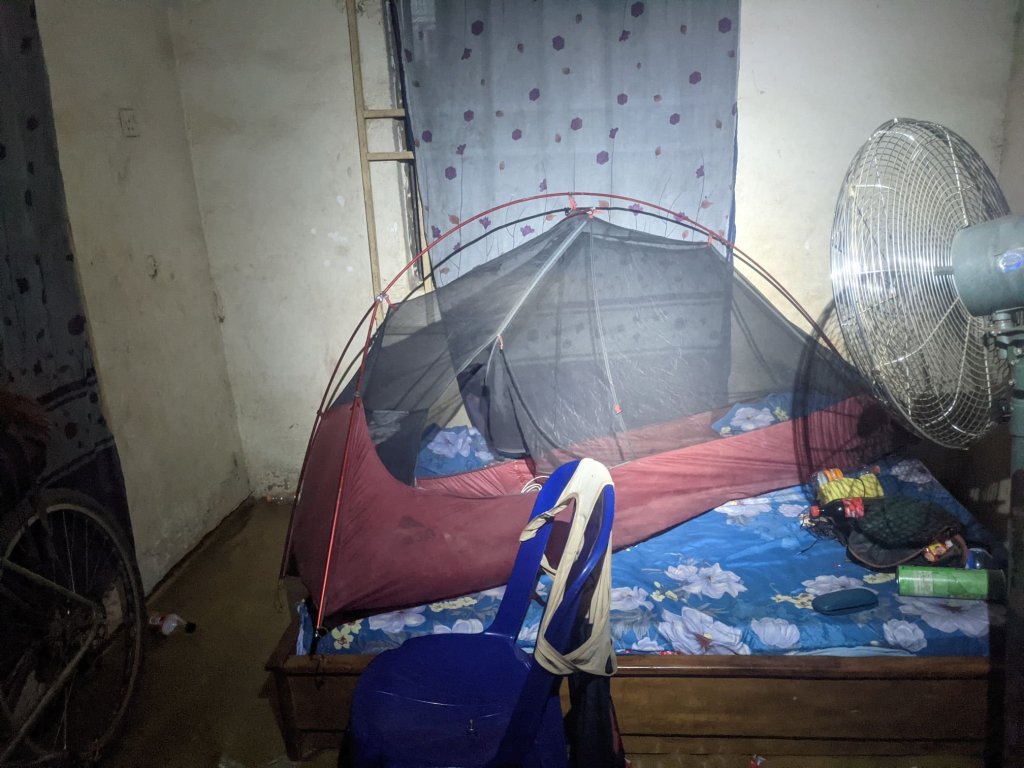
In the morning I set off cycling on a road that was generally better than the previous day. The shouting in Nigeria is high enough that I end up just tunnel visioning and focusing on getting to the end of the day.
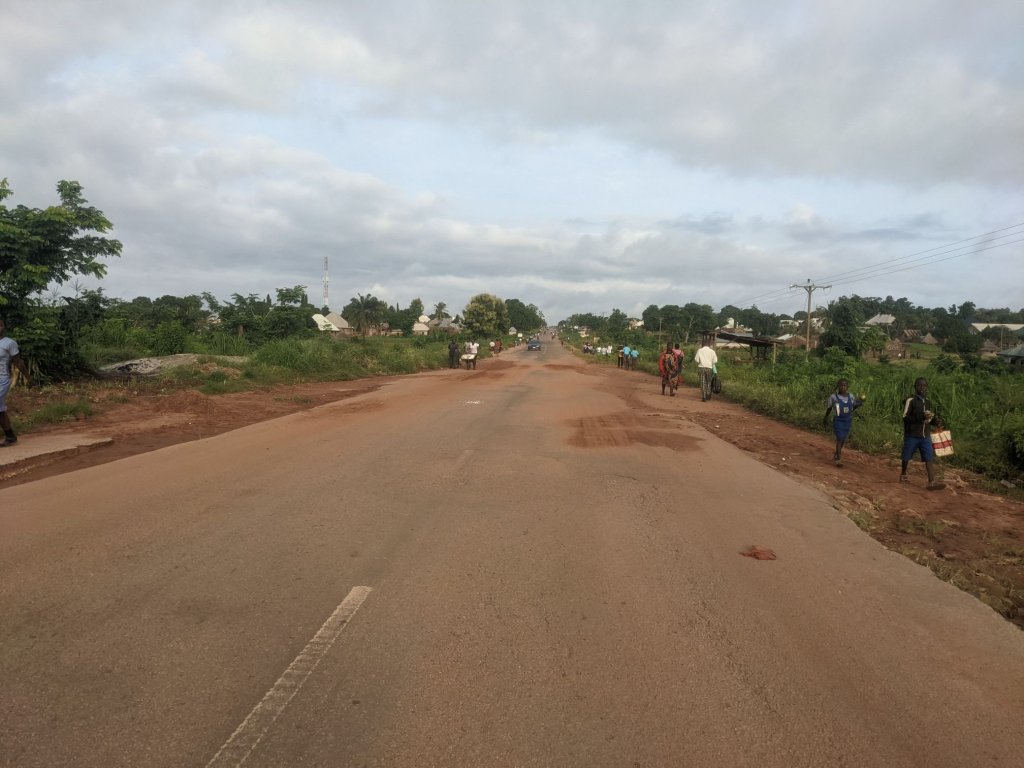
There was a bit of a rough stretch of the road, lasting for an hour or so. I was going faster than many of the trucks. I overtook an army vehicle at one point and didn’t see it overtake me again until well after the road had smoothed out. It was followed by big trucks carrying tanks, which must have had to go very slowly on that bumpy road.
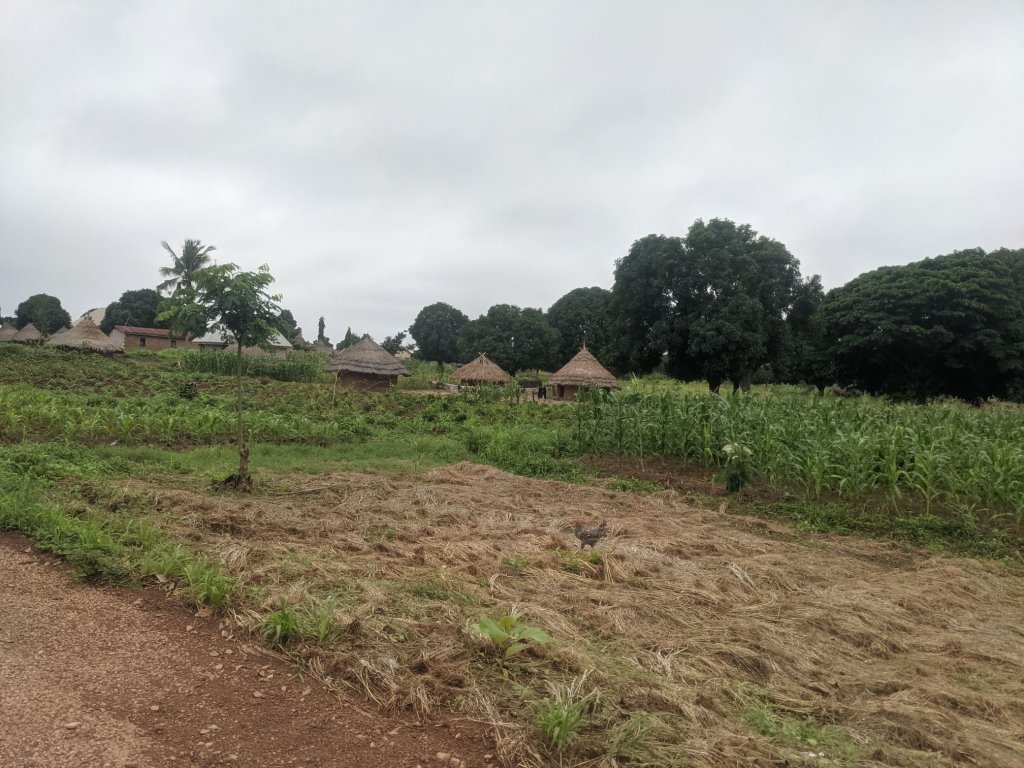
I reached the town of Otukpo and went to check into a hotel. I wanted one with AC and the one I ended up going to was quite expensive, at 5500 Naira (£11). I was tired, it had AC (from 6.30 until 2 AM) and I decided to just take it.

My phone charger had stopped working a few days ago so I went out to buy a new one. I returned to the hotel and waited for the electricity to come on. As usual they were late in going to turn the generator on. When they did so, they found it didn’t work. They worked on it for ages, I moved my tent outside and lay down there for a while. After a couple hours they got the generator working. I was offered a room upgrade for the inconvenience but I declined; I wouldn’t sleep any better in a bigger room and it’d just mean I had to move all my stuff. My new charger turned out not to provide enough current.
In the morning the sky was incredibly overcast. Even a couple hours after sunrise it looked like twilight. I cycled out of Otukpo and the road soon became quite quiet – even more so when it started to rain and people went to shelter.
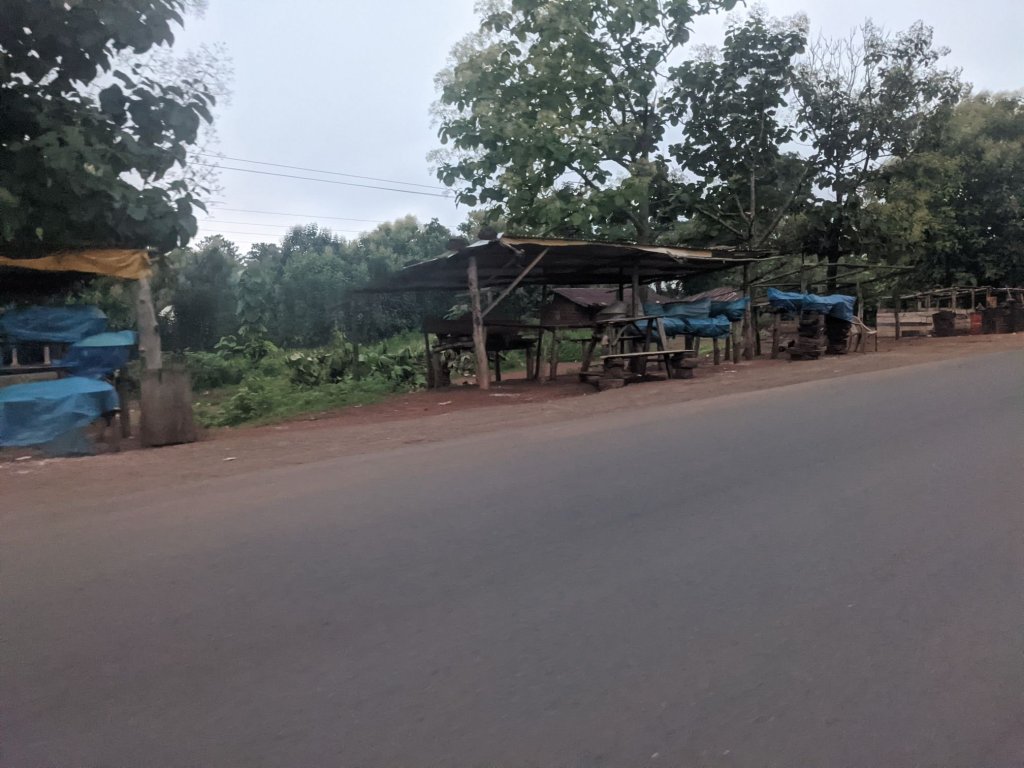
Despite the rain it was more pleasant cycling than usual, mostly due to the lack of people around. I cycled along through the forest, completely soaked.
It started to get a bit busier but then I turned into another road. It was somewhat more potholed but at least initially, less busy.
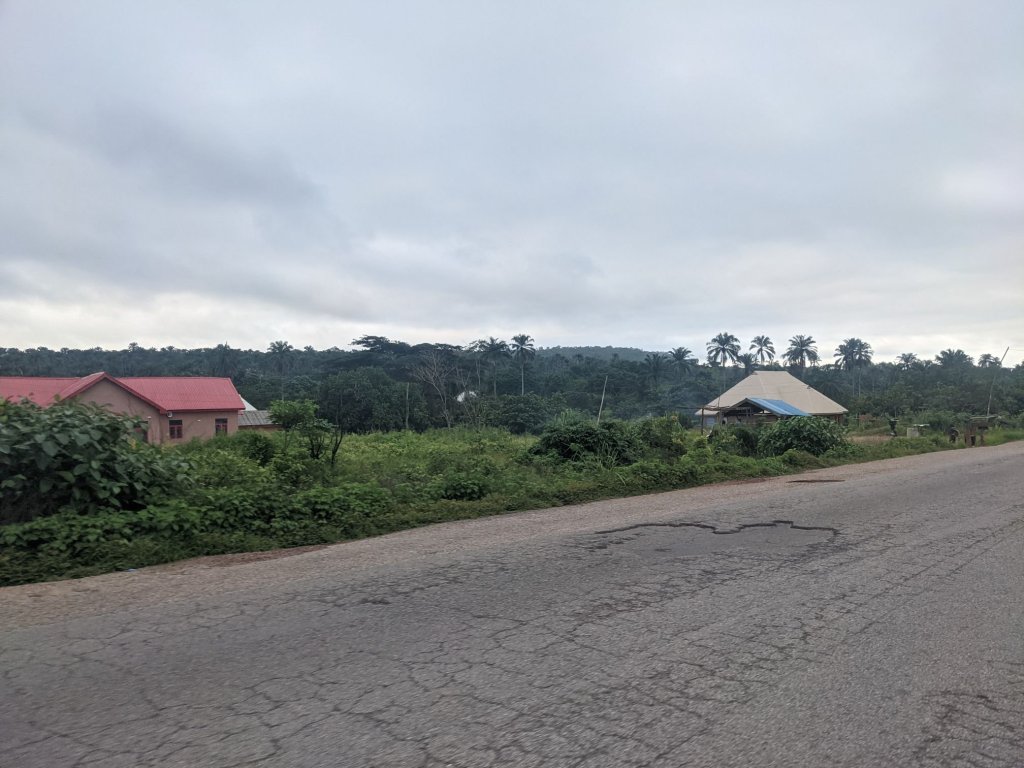
The rain cleared up in the afternoon and I dried out as I cycled to Ejule, my destination for the day. There was a hotel on the way into town, 3000 Naira for a room with a fan, with the generator running from 6 until midnight. I needed to buy some things (food, a charger) so I decided to look for a different hotel as well. I bought a charger. The shop had a generator so I was able to make sure this charger worked.
The only other hotel was on the far side of town. I was directed there and asked if they had rooms available. They were pretty expensive at 5,000 Naira with no AC. As the guy was showing me the room he said “it’s not available today but maybe tomorrow.” Wouldn’t it have been better to start with that? I rode back to the first hotel.
In the morning the road trended downward for the first few hours as I made my way to the Niger river. This is Africa’s third longest river, after the Nile and the Congo. It didn’t look that big at first but after several minutes cycling across the bridge I had to admit it was pretty wide.
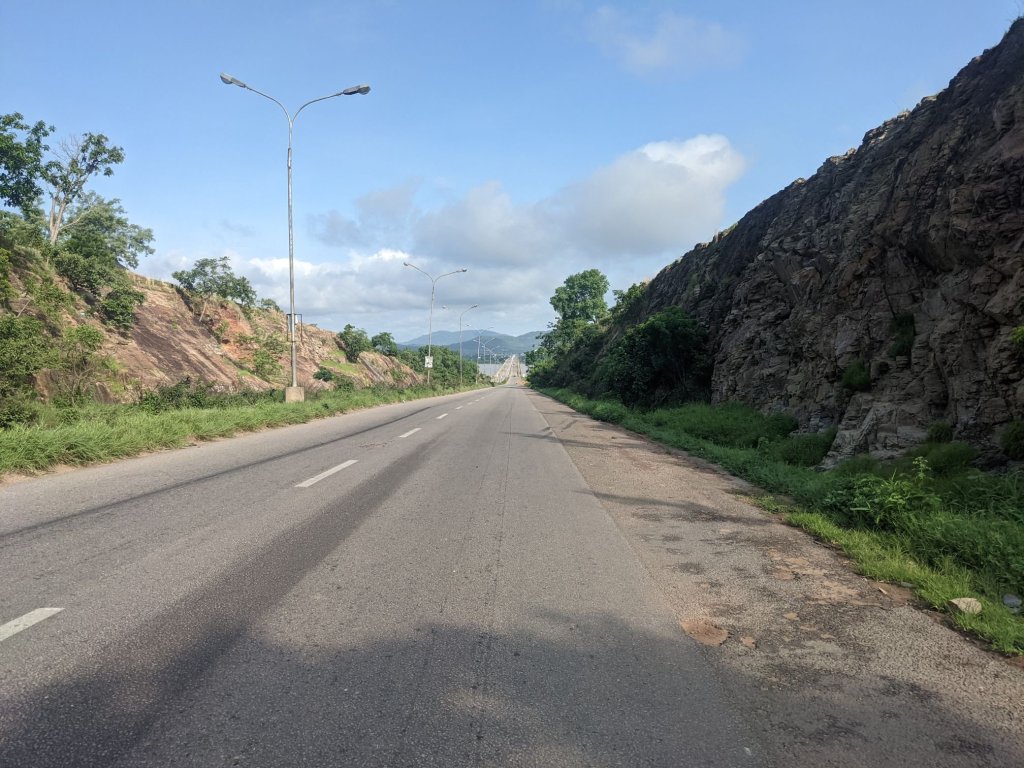

There was quite a lot of heavy industry on the far side, an unusual start. Someone gestured for me to stop and talk to them. This happens many times a day and I’d often keep riding but as I approached, this guy called out that he was a cyclist. I stopped and chatted to Alex. It’s quite common for people to ask for my social media, but less common for them to ask for my Strava!
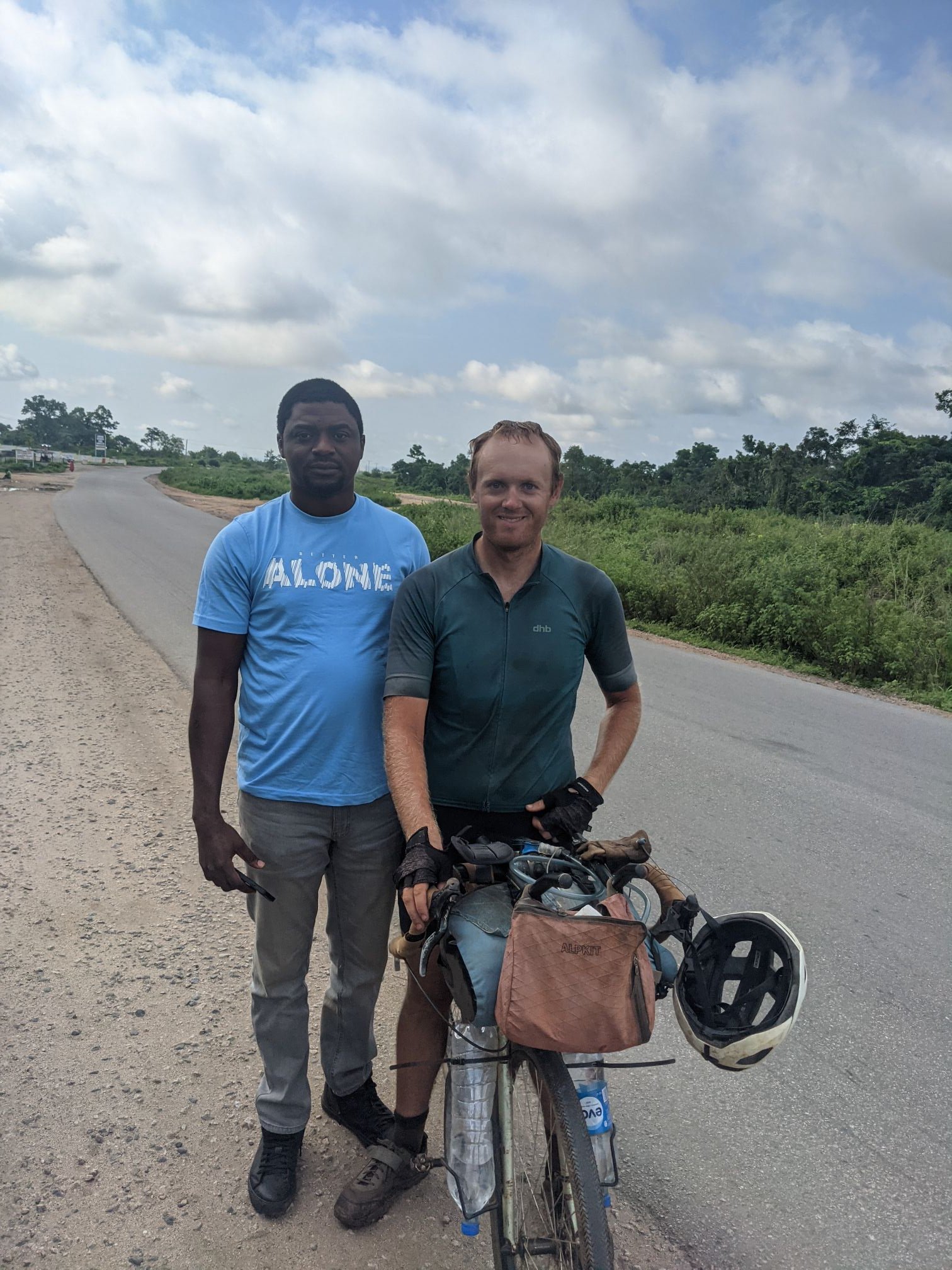
The road remained a dual carriageway. In reality this meant that everyone drove on whichever side had the best surface. I didn’t bother swapping around much; I didn’t have much of a preference between a better surface or less traffic.
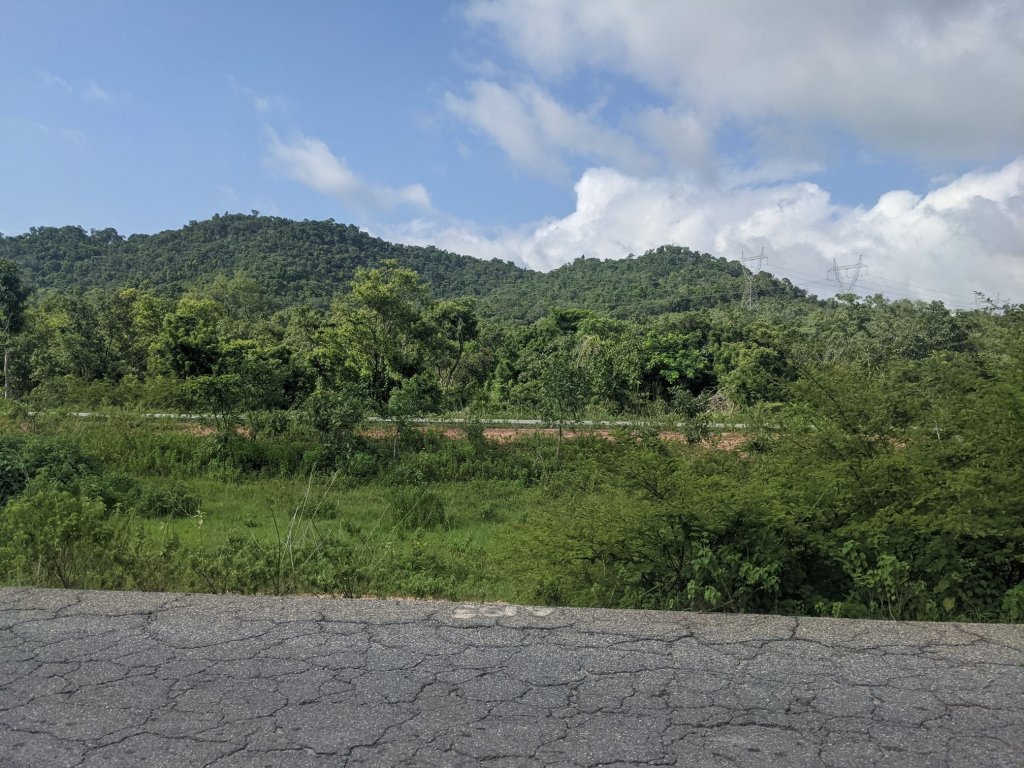
The people at the checkpoints seemed to be making more of an effort to stop me today. At the first one the guy wanted to see in my bags. I only opened the easily accessible ones. He asked to see my passport but I told him immigration had told me to only show it to them. He said they were lying but didn’t protest when I walked around him and rode off.
At the next they tried to stop me again but I swerved around them and cycled on as they angrily yelled “pay!” That’s the real reason for most of these checkpoints: to collect bribes. Whenever I see a vehicle stopped, someone puts some money out the window and they keep going. I have read that because corruption here is so widespread, it is self-reinforcing. Police have to bribe their superiors to keep their jobs, so they have to bribe civilians to get the money…
At the next one, I was stopped again. I asked why and he said he wanted to ask some questions. I said to go ahead, but he insisted that I move somewhere else first. I told him if he had questions he could ask them, otherwise I would leave. He was silent and I rode off.
The next checkpoint seemed less official. The line between random thugs and state-sanctioned thugs is often unclear here. Even when they have guns and some sort of uniform, the uniforms are rarely, well, uniform, and they don’t usually have nametags. These guys had no uniforms, just lengths of wood with nails which they threw into the road to try and stop vehicles. As I approached, a group of vehicles came through, most dodging the sticks or just driving straight at the men. Only one stopped to give them money. They tried to stop me but I just swerved past and said “sorry, got to go.”
I rode on and reached the town of Ibillo. After going to a shop to get some food (biscuits and instant noodles, which is all they usually have) I went and checked in to a hotel. They forgot to turn the generator off around midnight so the fan kept me comfortably cool all night.
I set off early the next morning. After spending the morning on reasonably quiet roads, I reached the town of Owo, and joined a bigger road headed to Akure, a city of half a million or so people.
There was only one notable checkpoint incident that day. After riding through one without being stopped, a policeman evidently decided he might be able to get a bribe from me. He commandeered a motorcyclist to chase after me.
When he caught up to me he angrily insisted I go back to the checkpoint with him. I asked why, he said he wanted to ask some questions. I said he could ask them here. He insisted we go back (a fair distance). I insisted we stay here. He relented. He asked a couple basic questions (where I’m from, where I’m going) before getting to the important question: “what have you got for me?” “Nothing,” I said, and cycled off.
The road initially wasn’t exceptionally busy – it certainly wasn’t congested. But the driving standards leave much to be desired. People overtake regardless of whether it’s safe to do so; I often had to get off the road to avoid being crushed. Honking is constant. These are common behaviours in Nigeria but traffic here was enough to make it particularly unpleasant.
In a way it improved as I got nearer the city; paradoxically this was because there was more traffic. The congestion meant they couldn’t go as fast and I was pretty much able to match their speed, thanks in part to the omnipresent potholes and speed bumps. I made my way to a hotel and checked in.
I took a rest day here. I took a taxi over to ShopRite, and enjoyed the opportunity to have a wider variety of food. I even got a pizza.
I set off early on Sunday morning. It was my earliest start in quite a while and I was surprised to find it still dark at a quarter past six. The last couple weeks I’ve been riding west, and it’s having an effect!
Traffic was moderately busy despite the hour as I cycled out of Akure. Gradually it lessened, only to begin to increase again as I approached another city, Ilesa. I detoured through the city as I needed to visit an ATM, having forgotten to do so before leaving Akure.
Getting out of the city took a while but then I rejoined the main road which was by now a dual carriageway. Not everyone drove on the correct side, but most did. It felt a bit less dangerous, if not exactly safe. As they overtook me, vehicles swerved to avoid potholes, while simultaneously over/undertaking other vehicles.
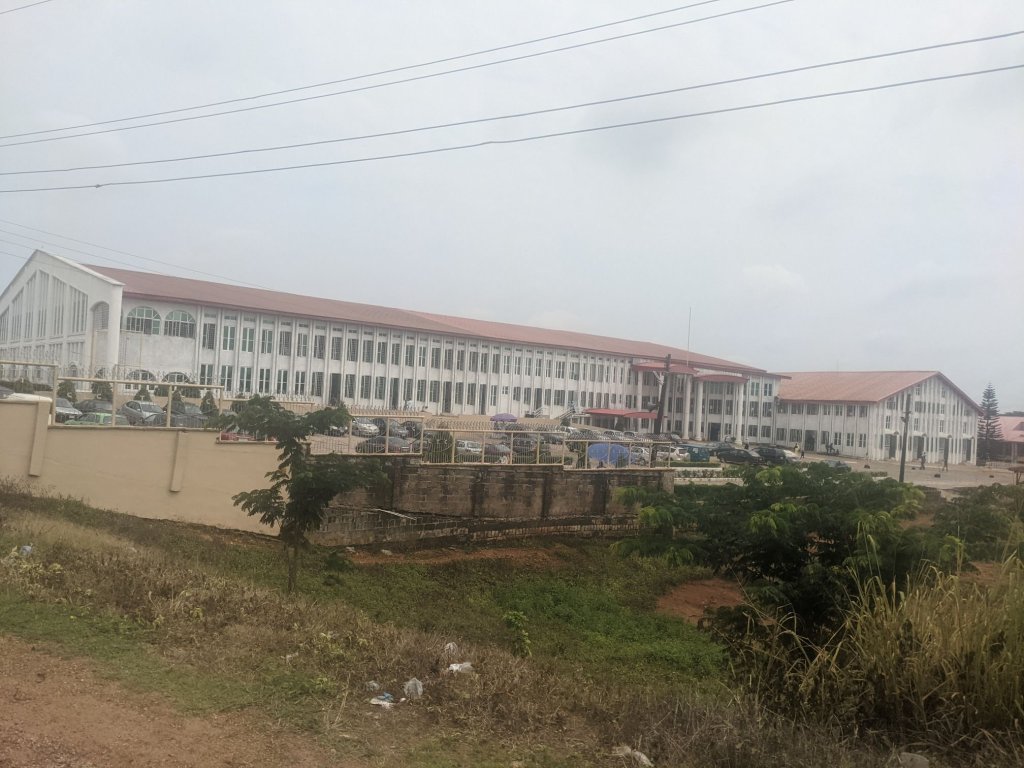
There was lots of honking of horns. Some people do so near-constantly, seemingly without reason. Others do so because they see a white person. Some, mostly truck drivers, use their horn to say “I’m driving right at you. Get off the road or I will kill you.” I don’t enjoy that.
At one point my chain slipped into the smallest cog and my shifter had no effect. At first I thought the cable had broken, but in fact the cable housing had frayed at the end. I soon reached a place with lots of workshops, and looked for some wirecutters. I couldn’t find any but someone managed to saw off the frayed end of the cable housing with a knife. I later felt my front gear cable beginning to fray. It’s about 600km to a Decathlon in Ghana, where I hope to be able to replace the cables and housing. It didn’t shift well, but it worked. Kind of.
Next to these workshops was a small market, which meant there were speed bumps. When cars slowed down they were surrounded by hawkers selling food and drinks.
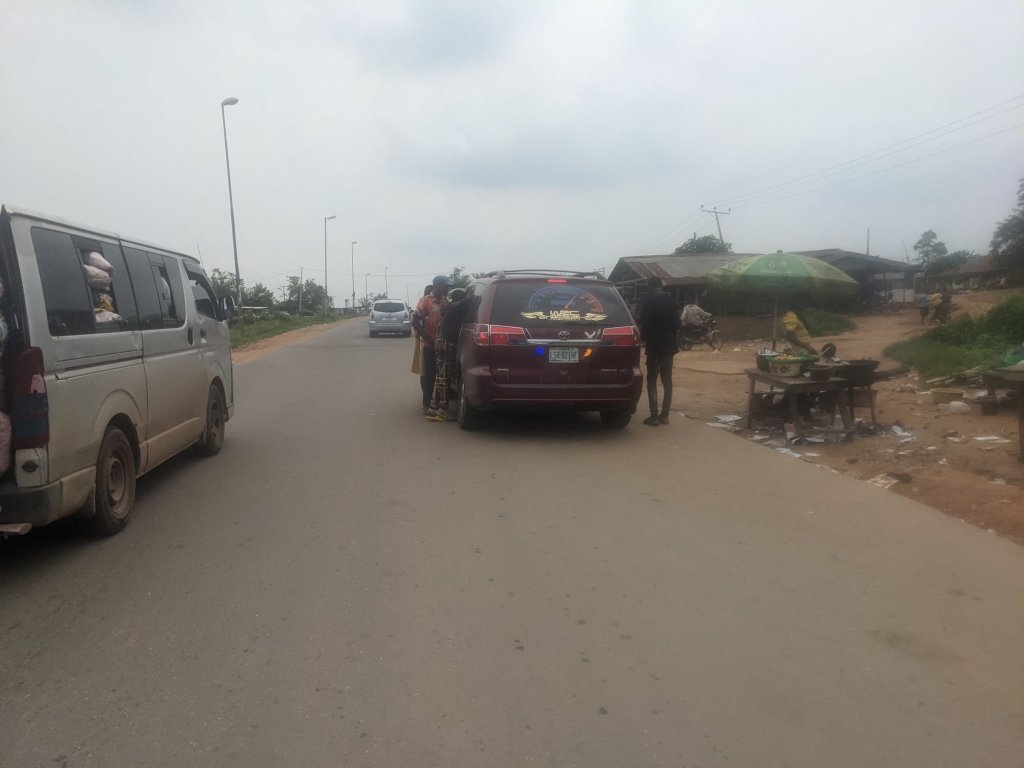
I reached the town of Ikire, and followed the highway around it’s edge. I stopped at a hotel which, at 6000 Naira (£12) a night is a bit more than I’d usually pay. I didn’t feel like spending ages hunting around for a better deal so I decided to stay.
It was still dark when I left in the morning. Conveniently, one side of the dual carriageway was still under construction. There was a short dirt section but mostly it was freshly tarmac. There were a few motorcyclists but mostly I had the road to myself for 5 km.
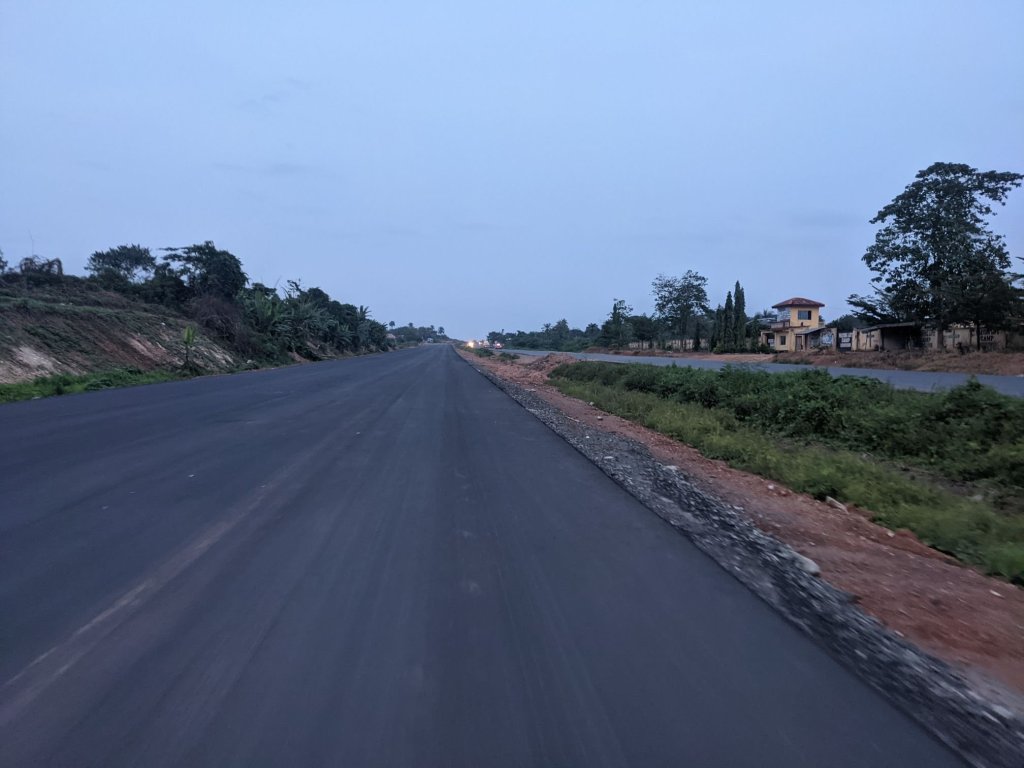
After that the road was open again so most people were driving on the correct side of the road. Traffic gradually increased as I grew closer to the city of Ibadan. Depending on how you define the city limits, it has a population of 6 million and is the biggest city by area in west Africa.
Once I got closer to the city centre the traffic slowed as congestion got worse. Where the road turned from dual to single carriageway there were several kilometres where cars barely moved and I joined the motorbikes filtering around them.
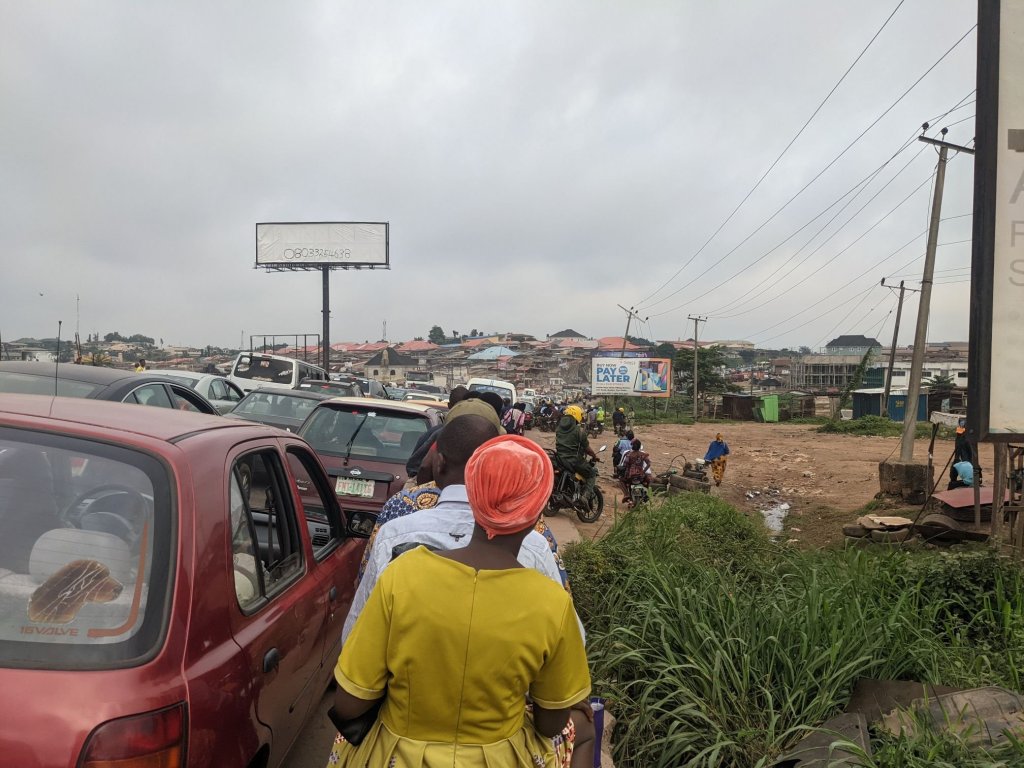
Another long stretch of stationary traffic was explained, to my surprise, by a traffic light. It seemed remarkable that in a country where people do not reliably drive on the correct side of the road, this traffic light commanded complete obedience.
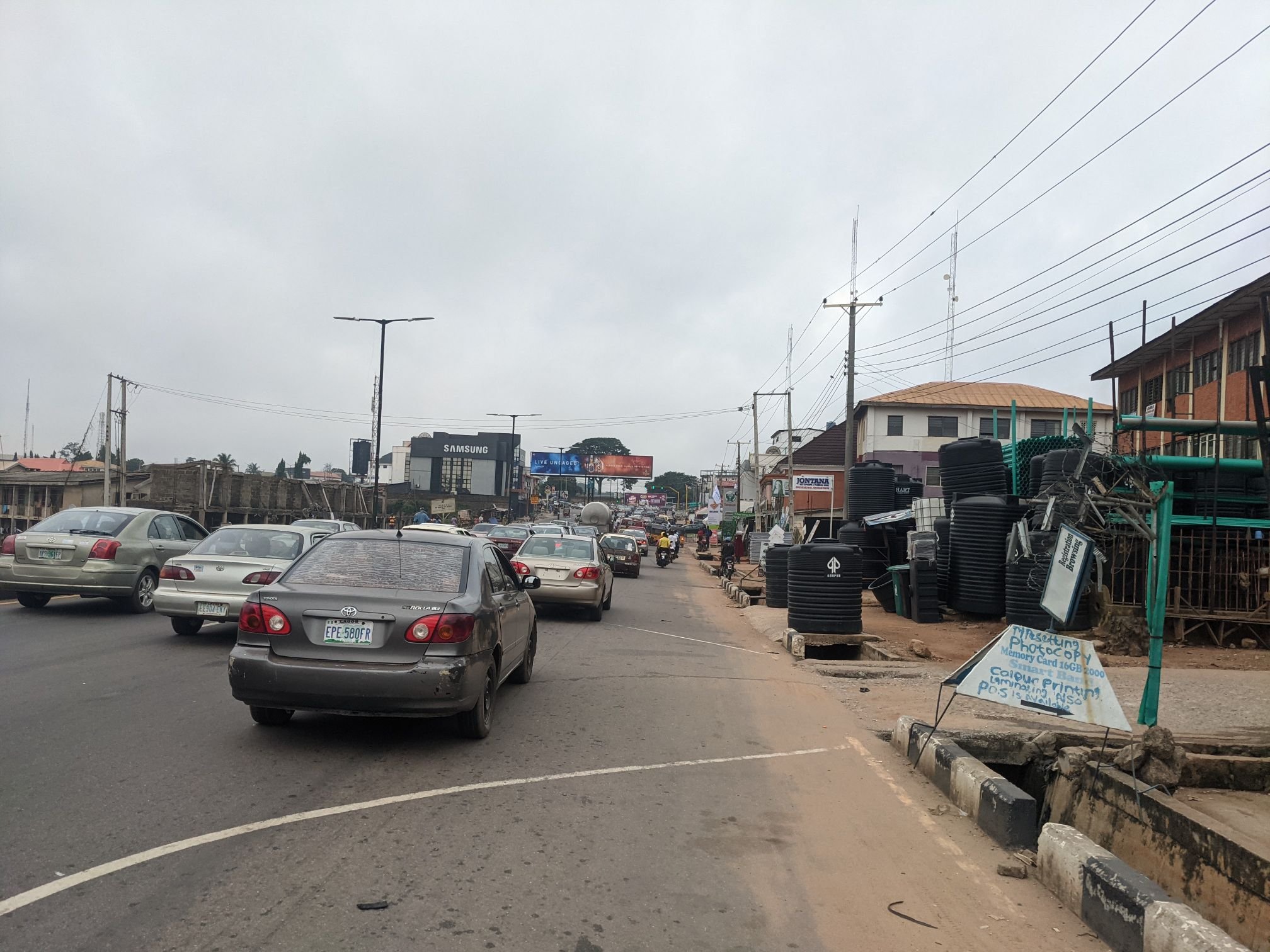
Gradually as I moved away from the centre, vehicles started moving again. The urban area continued for another couple of hours.
Finally I returned to the countryside, where the road was quiet enough that my thoughts could wander, as I didn’t need to dedicate my full focus to dodging vehicles.
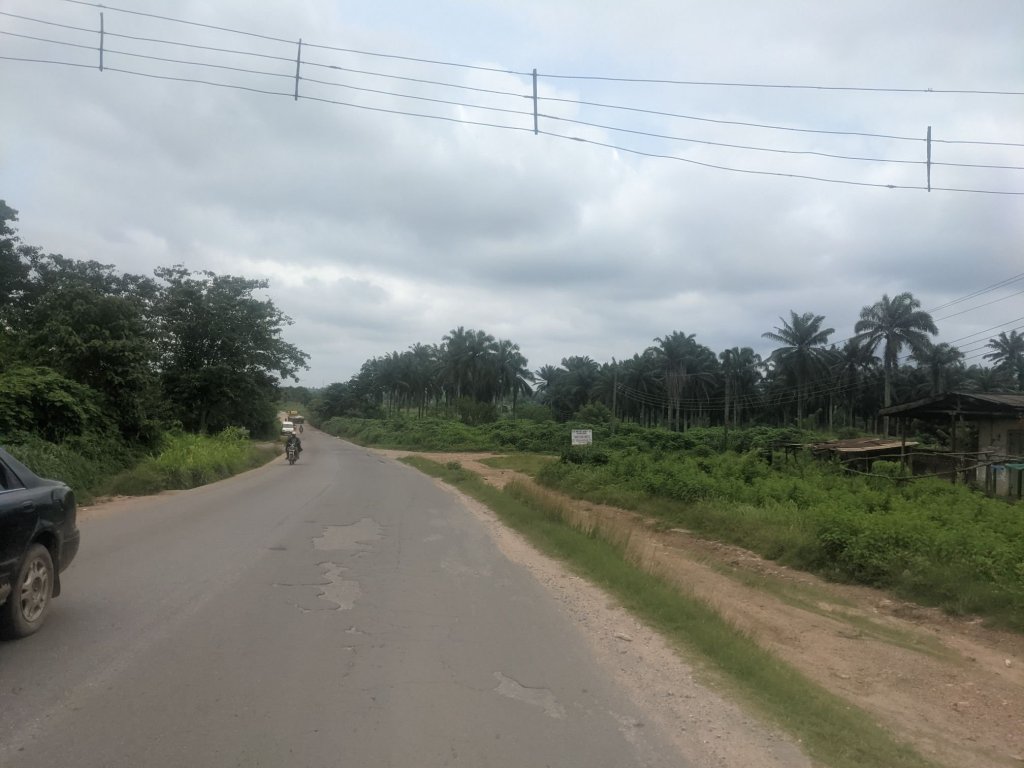
This only lasted an hour or two before I started to approach another city, Abeokuta. With a population of half a million, the city is sizable, if not as big as Ibadan. The roads here were much worse though – as in, potholed. There were also a lot more of those annoying people who regard every second not spent honking their horn as a second wasted.
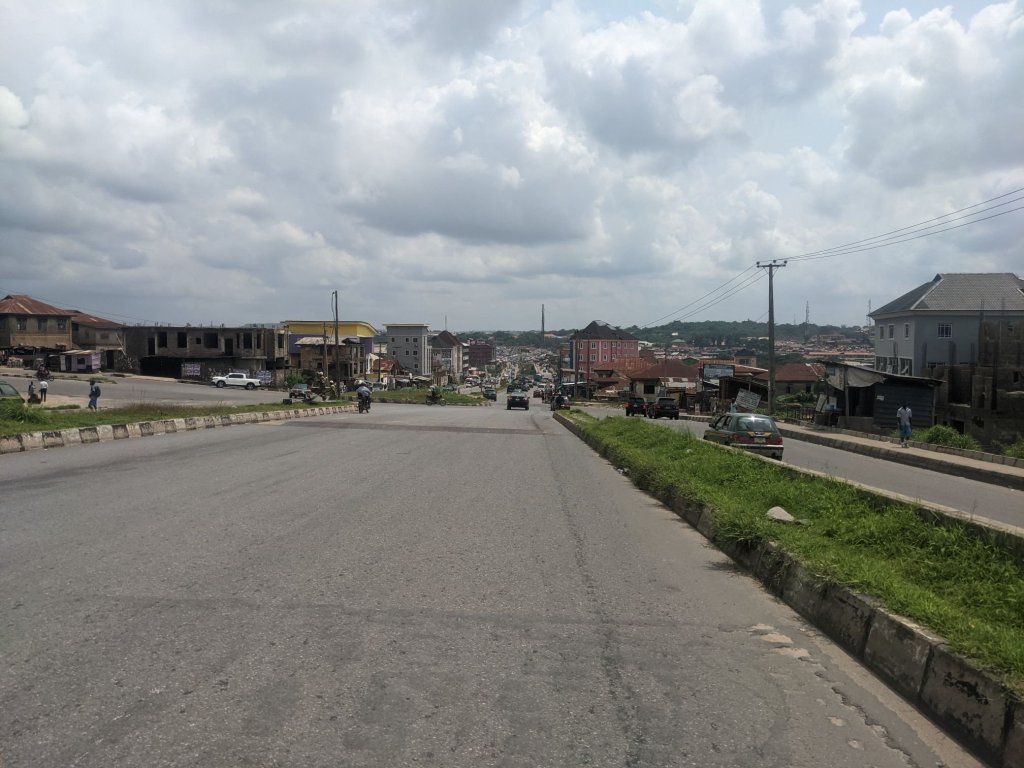
I stopped on the way through to print off a couple copies of my Benin e-visa. As I rode on, my front gear cable snapped. I tied it to the frame and adjusted the cable tension so the chain would stay in the middle chainring. Now I had a non-functioning front shifter and a semi-functional rear one. Who needs gears, anyway?
I took a smaller road out of the city. Initially it was very potholed – much more pothole than tarmac. It was also busy, a combination which meant I cycled through a perpetual cloud of dust.
Thankfully the road improved and traffic lessened. I cycled along this quiet country road, occasionally passing some badly flooded sections.
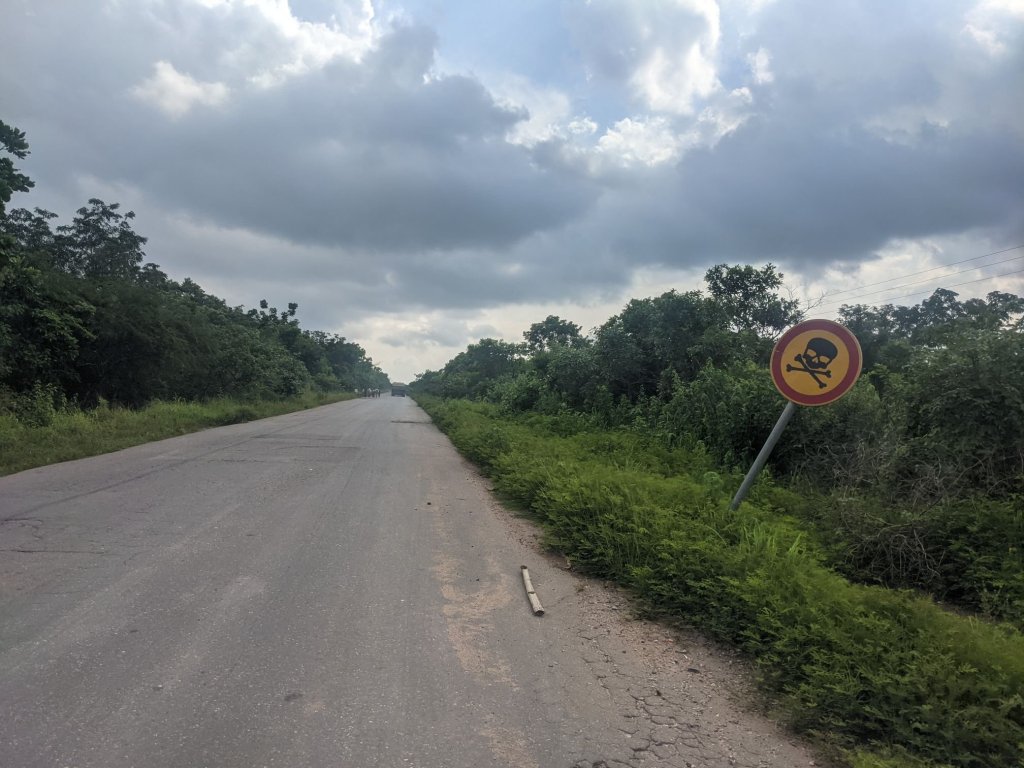
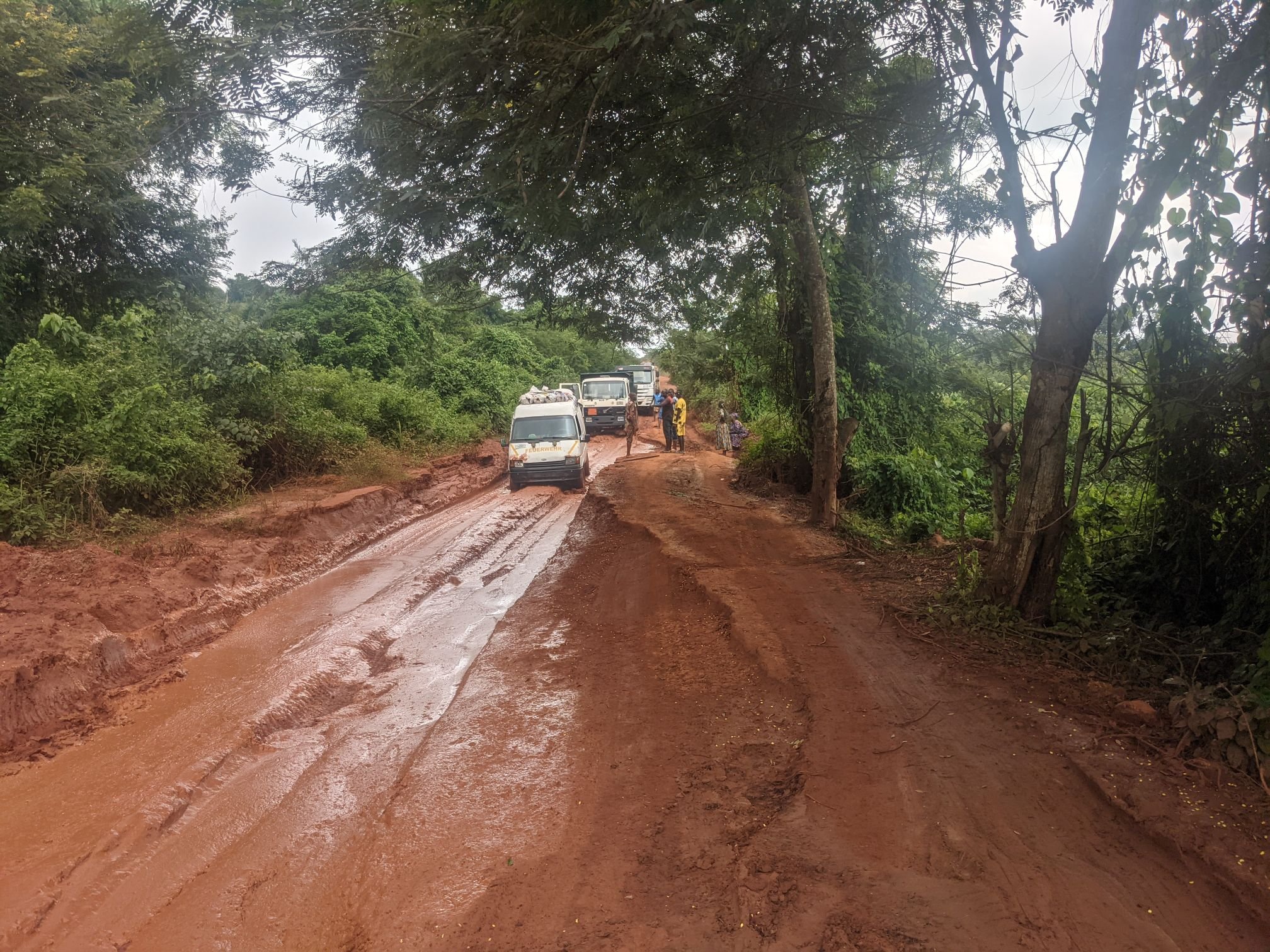
It began to rain, quite heavily. When I passed a guesthouse, I decided to stop, though it was an hour or so earlier than I’d planned to. From here it should be just a few hours to the border with Benin.
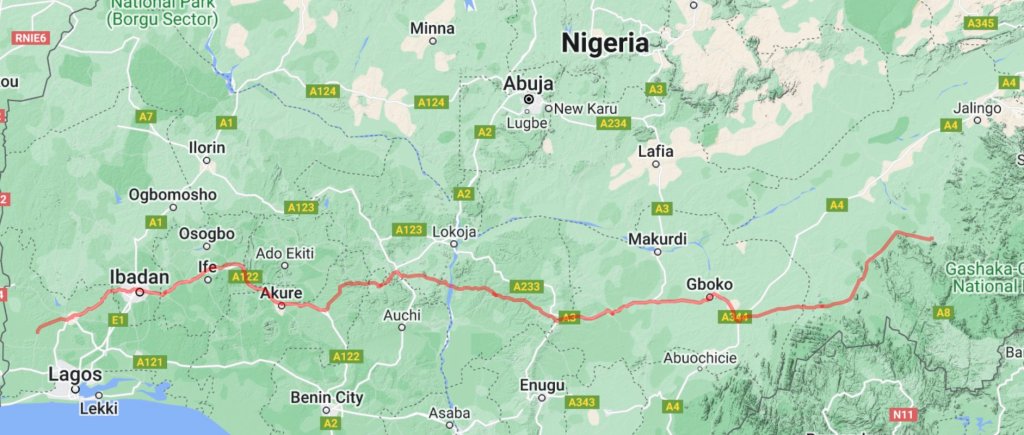
June 26: 149 km
June 27: 135 km
June 28: 102 km
June 29: 136 km
June 30: 134 km
July 1: 121 km
July 3: 147 km
July 4: 150 km
Well done for not getting kidnapped Sam. Crikey, I feel pretty stressed out reading this blog, and now your gear cable’s bust too. On a more positive note, how were the Pringles?
LikeLike
Thanks Janet. The Pringles were great! Sour Cream and Onion, but then another day I saw Salt and Vinegar so I had to get those.
LikeLike
Sam, I admire your fortitude not giving in to demands for a bribe and..and actually getting away with it. Stay safe
you are someone very special. Cheers Jorg
LikeLike
Thanks very much Jorg. I do try and make an effort into not giving into that sort of thing. It just makes it more difficult for the next person who comes along
LikeLike
Hi Sam.
Colin here.
Just went round to visit Nic and got the bad news. So sorry to hear of the malaria and the end of your absolutely amazing circumnavigation of Africa. We are all in awe of you.
I hope you get well soon and have no lasting effects. I also hope that you can make it to Calgary next summer and we can cycle together in the Rocky Mountains.
Colin and Irene
LikeLike
Thank you very much Colin. I am mostly recovered from the Malaria now thankfully.
My exact plans aren’t settled yet but I think it is probable I’ll be in Canada next year. Look forward to seeing you again, it’s been a long time!
Sam
LikeLike
Hi Sam
I really enjoyed your latest log and felt that you must have adopted the mantra “ feel the fear and do it any way.” Then I got to the comment about Malaria. I do hope you are ok and will soon be on that bike again.
Take care now Lynda
LikeLike
Thanks Lynda. I am mostly recovered from the Malaria now. It made me think though and I am just not feeling passionate or excited about the rest of the way in Africa right now, and feel ready for a break.
Rather than struggle on just focussing on covering the miles without enjoying it, I decided to fly home and rest. I may return to finish this section when I have more passion for it
LikeLike
Good to hear your wise choice took you back to base camp!
After reading that last
African blog the Canadian Rockies sounds like a dream.
Passion takes us on!
Rest up xx
LikeLike
I happened to stumble on your blog, and was drawn in by the prospect that somebody had apparently cycled though Nigeria. Having spent a couple years in northern Nigeria, I was duly impressed. It was interesting to note how little things have changed since I was last there in the 1980s. You are well done (as they say in Nigeria) to have survived the Nigerian highway system, of which we used to say was characterised by the roads of yesterday, the vehicles of today and the drivers of tomorrow. Potholes, makeshift roadblocks manned by shake-down artists, low-flying coffins thinly-disguised as inter-city mini-buses, vehicles driving on both sides of the road in both directions while honking more or less continuously. Ah, good times. If you’re passing through our town next year on your way across Canada, you’ll have a bed and a warm shower waiting for you. Best of luck!
LikeLike